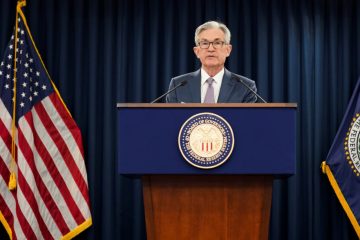Dollar slipped on improved risk sentiment after Fed indicated low interest rates will remain

The U.S. dollar slipped to three-year lows against the British pound and antipodean currencies on Wednesday as the promise of extended easy monetary conditions globally boosted investor appetite for riskier assets.
The New Zealand dollar dipped briefly before rallying to the highest since April 2018 after the country’s central bank emphasized patience over the timing of exiting ultra-easy policy settings.
U.S. Federal Reserve Chair Jerome Powell reiterated on Tuesday that interest rates will remain low and the Fed will keep buying bonds to support the U.S. economy, which many analysts and investors view as a long-term negative factor for the greenback.
ADVERTISING
Money flowed from safe havens like the dollar toward currencies that are expected to benefit from a pick-up in global trade, and to countries like Britain that are bouncing back quickly from the coronavirus pandemic.
“Signs of economic recovery are lifting commodities prices, which in turn supports currencies of commodities exporters,” such as the Australian dollar, said Junichi Ishikawa, foreign exchange strategist at IG Securities.
“Risk appetite has improved a lot, and this leaves the dollar at a big disadvantage.”
The dollar index against a basket of six major currencies was at 90.111, hovering near the six-week low of 89.941 it reached overnight.
The Australian dollar, which tends to benefits from rising metal and energy prices, jumped to a three-year high of $0.7945 before paring gains to trade 0.1% stronger at $0.7914.
The New Zealand dollar rose as high as $0.7384, following an knee-jerk dip, after the Reserve Bank of New Zealand (RBNZ) expressed some caution about the outlook, potentially disappointing traders who expected the monetary authority to acknowledge a recent improvement in economic data.
“Financial markets have been flirting with the idea that the RBNZ could tighten monetary policy next year, and today’s statement will have discouraged those holding that view,” Westpac analyst Dominick Stephens wrote in a client note.
“The RBNZ wants to see the whites of the eyes of inflation and employment before it shifts monetary policy.”
The British pound rose 0.3% to $1.4158 after earlier touching $1.4295 for the first time since April 2018.
The outlook for sterling has brightened as investors cheer Britain’s rapid coronavirus vaccination program and its plans to ease lockdown restrictions on economic activity.
The euro bought $1.21495, close to the one-month high of $1.2180 set overnight.
The dollar managed to rise against other traditional haven currencies, adding 0.2% to 105.485 Japanese yen and hitting an almost three-month high against the Swiss franc .
The Fed’s Powell pushed back against suggestions that loose monetary policy will lead to runaway inflation and financial bubbles, which have emerged as two important worries this year, because there is growing skepticism about the rapid pace of gains in global stock markets.
For economies that have limited disruptions caused by the coronavirus outbreak, their central bankers now face questions of when to start tightening policy, which makes the dollar look less attractive, some analysts say.
In the cryptocurrency market, bitcoin recovered to trade above $50,000 following a sharp plunge this week from its record high of $58,354.14 reached Sunday.
Square said on Wednesday it had invested $170 million in the digital asset in the fourth quarter, but some analysts still argue that bitcoin’s recent surge was excessive.
Rival digital currency ether rebounded from its own steep sell-off to trade up slightly at $1,618.


